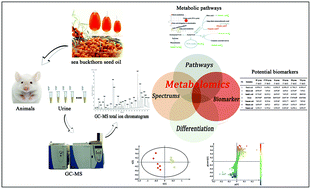Investigation on the antidepressant effect of sea buckthorn seed oil through the GC-MS-based metabolomics approach coupled with multivariate analysis†
Abstract
Depression is one of the prevalent and serious mental disorders and the number of depressed patients has been on the rise globally during the recent decades. Sea buckthorn seed oil from traditional Chinese medicine (TCM) is edible and has been widely used for treatment of different diseases for a long time. However, there are few published reports on the antidepressant effect of sea buckthorn seed oil. With the objective of finding potential biomarkers of the therapeutic response of sea buckthorn seed oil in chronic unpredictable mild stress (CUMS) rats, urine metabolomics based on gas chromatography-mass spectrometry (GC-MS) coupled with multivariate analysis was applied. In this study, we discovered a higher level of pimelic acid as well as palmitic acid and a lower level of suberic acid, citrate, phthalic acid, cinnamic acid and Sumiki's acid in urine of rats exposed to CUMS procedures after sea buckthorn seed oil was administered. These changes of metabolites are involved in energy metabolism, fatty acid metabolism and other metabolic pathways as well as in the synthesis of neurotransmitters and it is helpful to facilitate the efficacy evaluation and mechanism elucidating the effect of sea buckthorn seed oil for depression management.


 Please wait while we load your content...
Please wait while we load your content...